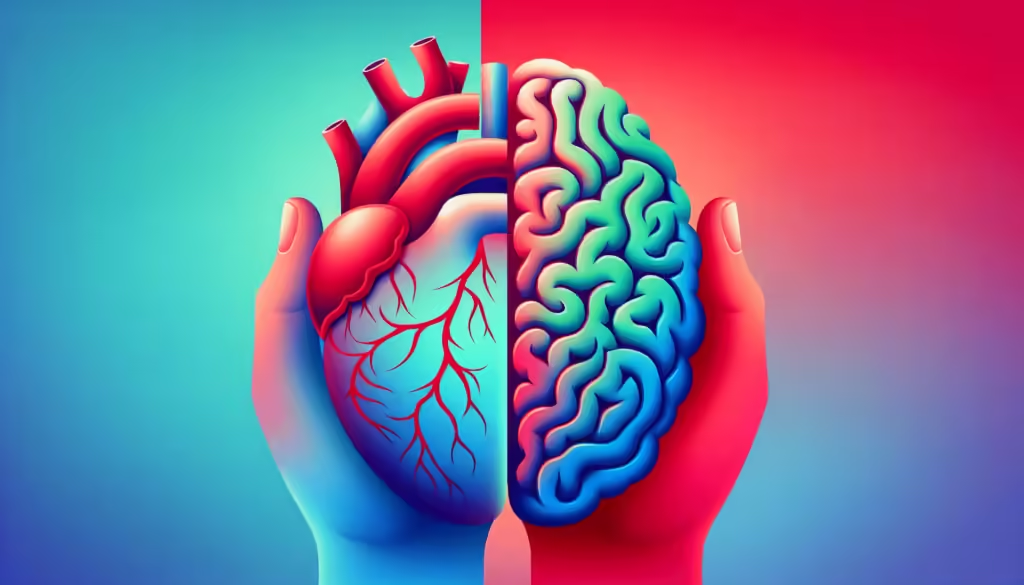Is it possible that the physical conditions you experience are intertwined with your mental health? This question is at the heart of an ongoing debate within the fields of medicine and psychology. The relationship between physical and mental illness is a complex one, filled with multifaceted connections that demand a holistic understanding. As you navigate this intricate subject, you’ll discover the importance of recognizing how intertwined your body and mind truly are.
In recent years, the discourse surrounding the connection between physical and mental health has gained traction, driven by a growing body of evidence that suggests the two are deeply interrelated. By comprehending this link, you can better approach treatment and wellness strategies, paving the way for more effective and compassionate healthcare. With this article, we aim to dissect this relationship, providing you with insights and clarity on a topic that is increasingly relevant in today’s world.

This image is property of images.unsplash.com.
Table of Contents
Historical Context
The relationship between physical and mental health is not a novel idea, but one that has evolved significantly over centuries. In ancient civilizations, mental and physical ailments were often seen as interconnected. For instance, the Greeks believed in the balance of the four humors, where an imbalance could affect both the mind and body. Over time, however, Western medicine’s focus shifted towards compartmentalizing illnesses, often treating psychological and physical conditions separately.
In the mid-20th century, the biopsychosocial model emerged, proposing that biological, psychological, and social factors all play a significant role in determining health and illness. This was a pivotal moment in bridging the gap between the physical and mental health sectors. Today, this model continues to inform holistic approaches to treatment and wellness, emphasizing the need to understand the full scope of what influences health.
Current Trends
The present time has seen a burgeoning interest in understanding how mental health affects physical wellbeing and vice versa. Researchers and healthcare professionals are increasingly acknowledging that poor mental health can contribute to physical diseases like heart disease and diabetes, while chronic physical conditions can lead to mental health issues such as depression and anxiety.
Current studies highlight that stress, a mental condition, can manifest physically by elevating cortisol levels, leading to hypertension and other cardiovascular problems. Similarly, chronic illnesses can become a significant source of psychological distress. Medical communities now advocate for integrated care approaches, where treatments address both the mind and the body to foster overall health.
Key Concepts and Definitions
To better navigate this topic, it’s essential to grasp some key concepts. Comorbidity refers to the presence of one or more additional conditions co-occurring with a primary condition; for example, depression might co-exist with a chronic illness like arthritis. Psychosomatic disorders indicate physical illnesses caused or exacerbated by mental factors. Understanding these terms helps you appreciate the nuanced relationship between physical and mental health.
Breaking Down the Link
Biological Factors
The physiological relationship between mental and physical health is often dictated by shared pathways. The body’s stress response, for example, involves a series of biological processes that impact both metabolism and mood. Neurotransmitters like serotonin and dopamine are central to mental health and are also influential in managing physical pain and inflammation.
Psychological Factors
Trauma and chronic stress can significantly affect your physical health. Experiences that invoke fear, anxiety, or depression can lead to lifestyle changes detrimental to physical wellbeing. This highlights the importance of psychological resilience as a protective factor against physical illnesses.
Social Factors
Your social environment plays a pivotal role in your health as well. Support systems and community connections can influence both mental and physical health outcomes. Social isolation, for instance, is linked to an increased risk of mortality, suggesting that social wellness is crucial for overall health.

This image is property of images.unsplash.com.
Case Studies
Example 1: The Impact of Stress on Heart Disease
Numerous studies examine how chronic stress contributes to heart disease. Stress activates the body’s fight-or-flight response, prompting physiological changes that increase heart rate and blood pressure. Over time, continued exposure to these stressors can lead to cardiovascular damage.
Example 2: Depression and Chronic Illness
Depression often occurs alongside chronic illnesses such as diabetes or arthritis. Research indicates that individuals with chronic conditions are at a higher risk of experiencing depression, which can further complicate their ability to manage the physical illness. Understanding this intersection allows for more comprehensive treatment plans.
Comparing Different Points of View
| Perspective | Supporting Evidence | Challenges and Critiques |
|---|---|---|
| Biopsychosocial | Incorporates multifaceted interactions of biological, psychological, and social factors. | May be too broad, lacks specificity in treatment recommendations. |
| Biomedical | Focuses on treating physical symptoms primarily through medication. | Often overlooks psychological and social dimensions. |
| Holistic | Emphasizes treating the whole person, mind and body, as interconnected. | Can be perceived as lacking empirical rigor. |

This image is property of images.unsplash.com.
Impact Assessment
Understanding the link between physical and mental health can dramatically change how treatments and healthcare policies are devised, ensuring that both mental and physical aspects are addressed collectively. This approach not only benefits patients but also improves healthcare efficiency by reducing comorbidity-related complications.
Future Directions and Implications
Looking ahead, there’s a growing recognition that integrating mental health care with traditional medical treatment could revolutionize healthcare. Predicted trends suggest a surge in interdisciplinary research and continued advocacy for policy changes that prioritize mental health as part of overall health strategies.
The implications for society include potential shifts towards preventative care, greater accessibility to mental health resources, and ultimately, an increase in life satisfaction and longevity. Understanding these connections empowers not only individuals but also healthcare systems to focus on prevention and holistic wellness.

Conclusion
To summarize, the intricate relationship between physical and mental illness underscores the need for healthcare systems and individuals to adopt a more comprehensive approach to wellness. Recognizing the interconnected nature of the body and mind can lead to more effective treatments and improved quality of life. As we move towards a future where these links are more widely acknowledged, what steps will you take towards a more integrated approach to your own health? Embracing this understanding could be pivotal for your well-being.

